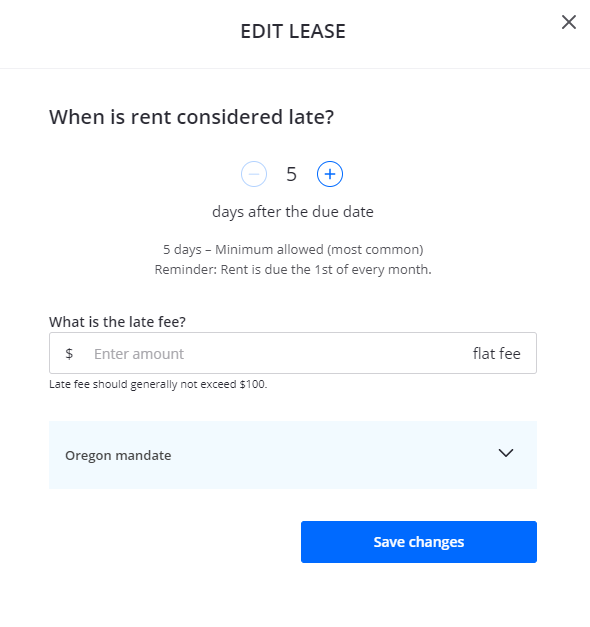8 Ways to Prevent Late Rent Payments

August 17, 2020
5 min read
Most people end up paying a bill or two late at some point, and rent is no exception. Your tenant may be late on rent for any number of reasons, including circumstances beyond their control. An unexpected expense, like a medical bill or car repair, can cause special challenges for renters. In a national survey, the Zillow Group Consumer Housing Trends Report 2019, only about half of renters (51%) said they could afford a $1000 unexpected expense.
A late rent payment might be a simple oversight — the first of the month can sneak up on anyone — but your rental is a business, and as a landlord, you want to ensure tenants aren’t paying their rent late every month.
Here are 8 steps you can take to increase your chances of receiving rent payments on time.
1. Set a competitive rent price
When first renting out your home, and again when renewing a lease or renting to a new tenant, you’ll want to take a look at your rent price and determine how much rent to charge. The monthly rent should be competitive with similar rentals in your area. Setting a reasonable and affordable rent price can improve your odds of finding renters who aren't going to be late paying rent. If the local market changes, you have flexibility to make adjustments to the monthly rent in accordance with your lease agreement and local laws.
2. Screen prospective tenants
Conducting a thorough tenant screening is one of the best ways to find a qualified renter who will pay rent on time. The typical tenant screening process includes verifying the applicant’s employment and checking their credit history, and you can also confirm the tenant's rental history and ask their previous landlord questions like, 'Did the tenant pay their rent on time and in full?' If a tenant doesn’t have a history of late rental payments, it’s probably safe to assume they’ll pay rent on time at your property as well.
3. Include late rent payment terms in your lease
Your lease or rental agreement lays out all the requirements and expectations between you and your tenant, including the rent price and payment due date. When creating a lease, be clear and specific about your rent payment policies, including when rent is considered late, if you allow a grace period for rent, and any fees the tenant is responsible for if they are late on rent. Some states require a grace period, so be sure to familiarize yourself with the laws in your area.

Tip: Use Zillow’s lease tools to upload and sign a lease online, or even build your own customized lease (available in select states).
4. Invite tenants to pay rent online
Simplify the rent payment process by inviting your tenants to pay rent online. Your renters get to avoid the hassle of searching for stamps, worrying about mail delays or taking time to drop off a check, and many will appreciate having a digital payment option. Zillow survey data found that 57% of renters want to pay rent online, but only 38% are given the option.*
You can use an online payment tool like Zillow Rental Manager to make paying and collecting rent more convenient for you and your tenant. Other benefits include:
- Automated payment options to reduce the risk of late rent payments
- Real-time visibility into your tenant's payment status
- All-in-one payment center enables payments for rent, utilities and deposits
5. Send rent reminders a few days before rent is due
Sometimes tenants just need a friendly reminder to get their rent in on time. Zillow Rental Manager's online payment tool makes this process easy: When renters set up recurring payments, they’ll receive an email notification of their upcoming payment two days before it is scheduled. If they don’t opt for recurring payments, they’ll receive an automated email reminder five days before the payment is due. Landlords can also use the tool to send a payment reminder manually.
If you own a multiunit property, you might also consider posting flyers in elevators or other common areas to remind tenants when rent is due and how they can make payments.
6. Notify your tenant immediately when rent is late
If a tenant is paying rent late every month, it can be disruptive to your business and make it more difficult to predict your cash flow, especially if you depend on the rental income to pay other expenses. It’s better to address late rent before it becomes an ongoing issue.
If your tenant’s rent is late, you can notify them right away using a late rent notice. A tenant may be late paying rent because they simply forgot to drop the check in the mail, or they may be experiencing financial hardship or other challenges. They may even be withholding rent due to an issue on your end, like failing to respond to a repair request. Notifying your tenant of the past due rent gives them a chance to remedy the situation or bring an issue to your attention.
7. Have a clear policy on partial rent payments
A tenant may ask to pay a portion of the monthly rent instead of the full amount due. Accepting a partial rent payment may have the unintended consequence of signalling to your tenant that a full payment is negotiable. In some jurisdictions, if you have begun eviction proceedings for nonpayment of rent and then accept a partial payment, doing so may delay or reset the eviction process. It’s always important to understand your rights and responsibilities under local landlord-tenant laws; contact an attorney in your area for more information.
If you feel your tenant is temporarily unable to pay in full but will be able to catch up, you might decide to accept a partial payment. In that case, it’s imperative to put everything in writing and include a clear payment plan and due date(s) for the remaining balance.
8. Keep track of late rent payments
Document rental payments in a payment tracking system so you have a record of any months that tenants were late on rent, missed a payment or bounced a check. It’s also a good idea to document any email, text, phone or in-person communications you've had with a tenant, and save copies of rent receipts, applications, leases and notices.
If your tenant is consistently late paying rent — or stops paying rent altogether — you may decide to send a pay or quit notice, which is typically the first step of the eviction process. If so, detailed records can help support your case.
Note: Due to the COVID-19 pandemic, there may be federal, state and/or local laws that temporarily limit or prohibit landlords from charging late rent fees or evicting a tenant for nonpayment of rent. Be sure to stay current on any landlord-tenant laws for your state, city or town, and speak with a local attorney if you have any questions.
* Source: Zillow Consumer Housing Trends Report 2019
Connect with us!
Learn how Zillow Rentals can help you reach your goals.
Stay informed. Stay ahead.
Access exclusive industry insights, market trends, and expert tips. Subscribe now to receive quarterly Zillow Rentals newsletters!